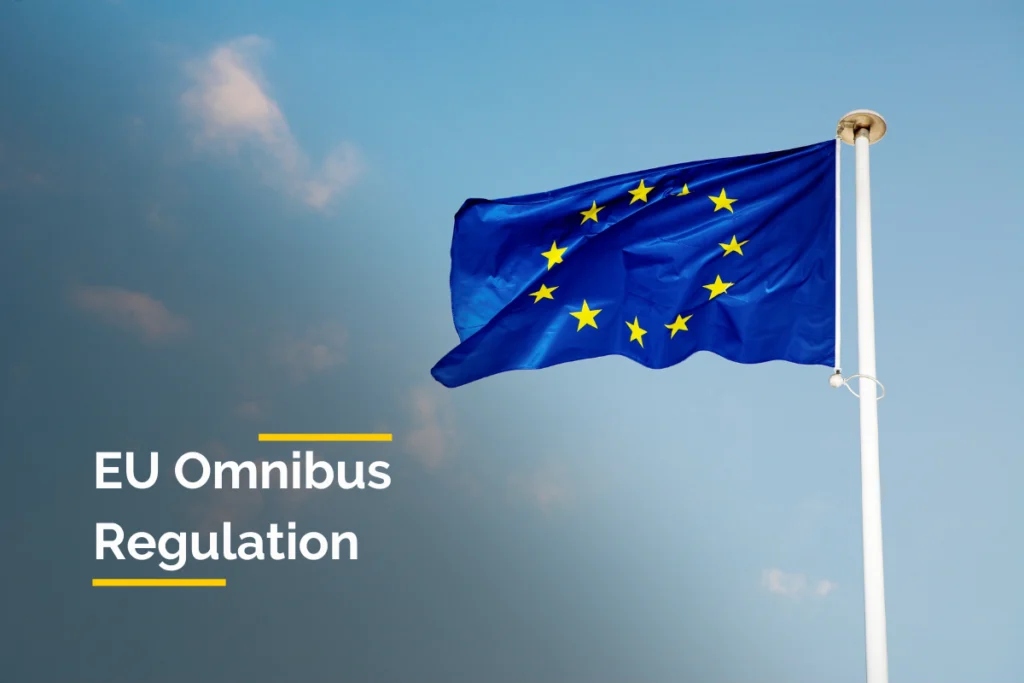
The European Union’s Omnibus Package represents a transformative approach to regulatory governance that streamlines legislation, enhances enforcement, and provides businesses with greater legal certainty. As part of the European Commission’s broader strategy for regulatory efficiency, the EU Omnibus Package consolidates multiple legislative frameworks under a cohesive structure. Covering areas such as corporate governance, consumer protection, sustainability, and compliance, this initiative simplifies the regulatory landscape without diluting its effectiveness.
The Omnibus Package is both an opportunity and a challenge for businesses in the EU. While it promises to cut red tape and standardize regulatory expectations, it reinforces corporate due diligence obligations, sustainability, and supply chain accountability. Companies must understand these changes, ensuring compliance frameworks are aligned with the evolving regulatory landscape.
What is the EU Omnibus Package?
The Omnibus Package is a broad legislative framework that reduces administrative burdens, improves regulatory enforcement, and clarifies compliance requirements. It is part of the EU’s Regulatory Fitness and Performance (REFIT) initiative, which seeks to modernize outdated legal structures while ensuring that businesses still meet high compliance standards.
Key Pillars of the Omnibus Package
- Regulatory Simplification – The package consolidates and revises existing laws, reducing bureaucratic inefficiencies and making compliance more accessible to businesses of all sizes.
- Enforcement & Compliance – Omnibus strengthens regulatory mechanism enforcement. This ensures businesses adhere to EU regulations with fewer inconsistencies across jurisdictions.
- Transparency & Standardization – Clearer rules and standardized requirements reduce discrepancies across industries, making compliance more predictable and enforceable.
When Does It Come Into Effect?
The final implementation timeline depends on legislative approvals and adaptation periods for EU member states. However, the Omnibus Package will be released on February 26, 2025. Companies should prepare now to ensure they are fully compliant when the new requirements take effect.
Why Now?
The Omnibus Package comes at a time when businesses are struggling to navigate a complex regulatory environment. With multiple overlapping directives and reporting requirements, compliance has become a costly and resource-intensive challenge for organizations. The EU hopes that streamlining regulations will simplify compliance while maintaining high regulatory standards that align with evolving economic, social, and environmental expectations.
How the Omnibus Package Impacts Corporate Sustainability Due Diligence Directive Compliance (CSDDD)
The Corporate Sustainability Due Diligence Directive (CSDDD) is a key regulation impacted by the Omnibus package. This directive imposes stricter due diligence obligations on companies regarding human rights, environmental sustainability, and ethical business practices. It mandates that businesses assess, prevent, and mitigate risks within their supply chains, ensuring compliance with EU sustainability regulations and ESG regulations.
How CSDDD Fits Into the Omnibus Reform
The Omnibus Package does not alter the core objectives of the CSDDD but seeks to refine its implementation by:
- Standardizing due diligence obligations across the EU to create consistency in compliance expectations.
- Improving enforcement mechanisms, ensuring that violations are detected and addressed efficiently.
- Reducing administrative duplication in sustainability reporting standards allows businesses to focus on actionable compliance measures rather than excessive paperwork.
What Businesses Need to Do Now
Companies operating within the EU should consider to take the following steps:
- Conduct a compliance audit to assess gaps between current processes and Omnibus Package requirements.
- Update sustainability and due diligence strategies to align with evolving EU regulations, including the Corporate Sustainability Reporting Directive (CSRD).
- Implement digital compliance tools to automate reporting, tracking, and risk assessment processes.
- Train internal teams on updated regulations to ensure smooth transitions to the new compliance framework.

30+ Audit and inspection checklists free for download.
Other Compliance Areas Affected by the Omnibus Package Beyond CSDDD
Consumer Protection and Fair Business Practices
Consumer rights laws are strengthened because the Omnibus Package builds on previous directives that improve transparency and fairness in business-to-consumer relationships. Companies must ensure their marketing, pricing, and contractual practices align with these enhanced consumer protection measures.
Stronger Enforcement of EU Regulations
A most notable aspect of the Omnibus Package is its emphasis on enforcement. The European Parliament and other regulatory bodies will have higher investigative authority over compliance breaches, impose penalties, and ensure that businesses meet their obligations under EU law.
Supply Chain & ESG Compliance Integration
The Omnibus Package aligns Environmental, Social, and Governance (ESG) reporting and supply chain due diligence with broader EU taxonomy standards. Companies must integrate these compliance areas into a cohesive strategy to meet evolving expectations in sustainable finance, climate change, and decarbonisation.
What Businesses Need to Do to Prepare for the Omnibus Package
1. Assess Compliance Readiness
Companies should begin by internally auditing their current due diligence and compliance frameworks. Identifying gaps and areas of improvement will ensure they are prepared for the new regulatory landscape.
2. Leverage Technology for Compliance Tracking
Automation and digital solutions will be critical for tracking regulatory changes, managing compliance workflows, and generating real-time reports. Investing in compliance technology can help businesses stay ahead of evolving requirements.
3. Stay Ahead of Reporting Requirements
With the Omnibus Package standardizing compliance documentation, companies should prepare for these changes by updating their internal reporting systems. Understanding new documentation formats and regulatory expectations will ensure seamless compliance.
4. Monitor Further Developments
The Omnibus Package is still evolving, and final regulatory texts may introduce additional compliance requirements. Businesses should stay informed through industry associations, regulatory briefings, and legal consultations to remain compliant.
A Positive Step Toward Simplification, But Compliance Expectations Remain High
The EU Omnibus Package is a significant step toward regulatory simplification and enhanced enforcement. While it reduces complexity in certain areas, it reinforces key compliance expectations, particularly in due diligence, ESG reporting, and sustainability regulations. Businesses that take a proactive approach to compliance—leveraging digital solutions and integrating regulatory requirements into their operations—will be best positioned to navigate these changes successfully.
Explore Certainty Software’s Compliance Solutions
Simplify your compliance journey and ensure regulatory readiness with Certainty Software’s suite of compliance automation and regulatory audit management and tracking solutions. Stay ahead of regulatory changes and streamline your compliance efforts with confidence.



